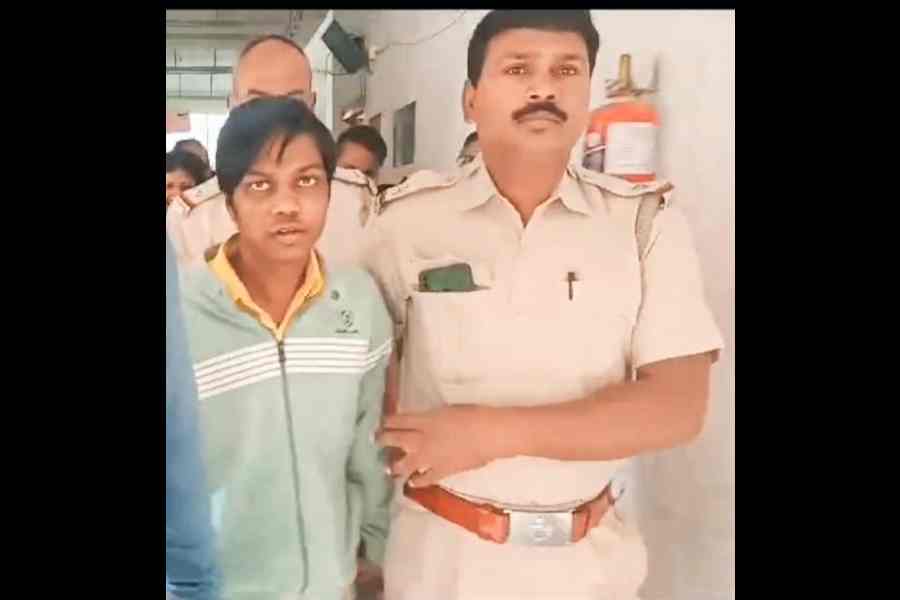A fast-track Pocso court in Baruipur, South 24-Parganas, on Friday sentenced a teenager to death for the rape and murder of a nine-year-old girl from Jaynagar
in October.
The conviction of Mustakin Sardar, 19, has come in a shade over two months (63 days) since the crime, the ruling Trinamool Congress highlighting it as an instance of swift justice delivery in Bengal.
The brutal crime had coincided with the peak of the protests against the August 9 rape and murder of a junior doctor at the RG Kar Hospital in Calcutta.
Chief minister Mamata Banerjee congratulated the state police and officials involved in the prosecution of the Jaynagar accused.
“Conviction and capital punishment in such a case in just over two months is unprecedented in the history of the state. I congratulate the state police and all those involved in the prosecution process for this outstanding achievement,” she wrote in a post on X.
“The government has zero tolerance towards offences against women and will continue to ensure that justice is neither delayed nor denied.”
Amid the delay in the progress of the RG Kar case — handed over to the CBI and monitored by the Supreme Court — the Bengal government had passed the Aparajita Bill to facilitate swift judgment and stringent punishment in rape cases. The bill is awaiting the President’s nod.
Trinamool second-in-command and Diamond Harbour MP Abhishek Banerjee welcomed the judgment and reaffirmed the need for strong legislation against rape.
“In cases of sexual offences, justice should be SWIFT and SEVERE!.... The next big step is the nationwide implementation of the Aparajita Anti-Rape Bill because strong legislation is the only way to create a deterrent against such atrocities,” he wrote on X.
Abhishek criticised the CBI for a “sloppy” job in the RG Kar case, a source close to him said.
“A sloppy and sluggish CBI has taken more than three months now and has failed to produce any concrete facts to ensure justice for the RG Kar victim,” the source quoted Abhishek as saying.
The Jaynagar crime occurred on October 4. The girl was returning home from a coaching centre. She knew Sardar well. He offered her a bicycle ride home but took her to a deserted place, where he raped and killed her, the prosecution said.
The girl’s family lodged a missing person complaint with Jaynagar police station late that night. After initial apathy, the police acted swiftly on October 5 morning after a public protest and took Sardar into custody within two-and-a-half hours, aided by witness testimonies and CCTV footage.
Sardar allegedly confessed and revealed where he had hidden the body, which was recovered from a swamp the same night. Baruipur police district chief Palash Chandra Dhali formed a five-member special investigation team (SIT) that completed the probe in 25 days.
The chargesheet was filed before the Protection of Children from Sexual Offences (Pocso) court on October 30. The trial began on November 4, the testimonies of 36 witnesses were presented, and the proceedings concluded on November 26.
Additional district judge (fast-track) Subrata Chattopadhyay delivered the judgment on Friday afternoon. He convicted Sardar under Section 103 and Section 65(ii) of the BNS, and Section 6 of the Pocso Act. The court directed the state government to pay a ₹10-lakh compensation to the girl’s family.
“Justice has been delivered in just 61 (sic) days. This has been made possible by the swift action of the prosecution and the active involvement of all stakeholders,” government counsel Bibhash Chattopadhyay said.
“Scientific and physical evidence were verified and presented effectively while the hearings continued late into the night to ensure timely justice. We appealed for the highest punishment and the judge ordered the death sentence.”
He added: “The most important thing was that the DNA profile of the accused matched.”
The RG Kar protesters had visited the Jaynagar victim’s home. A symbolic statue of the girl was placed in front of the stage in Calcutta where the junior doctors were holding their hunger strike. The “Justice for RG Kar” slogans were punctuated by cries of “Justice for Jaynagar”.
But nearly four months after the RG Kar atrocity, the wait for justice continues. The CBI has submitted a chargesheet against the arrested civic volunteer in the Sealdah court, and the trial has begun.
Bengal police expressed happiness at the Baruipur judgment in a post on X that also struck a self-congratulatory note.
“Justice for Jaynagar. We are pleased at the unprecedented way we have been able to deliver justice,” the post said.
The police arranged for a live Facebook session where they described the course of the probe and how it set a precedent in the state’s investigative history.
Speaking at the session, ADG (south Bengal) Supratim Sarkar said the “Gait Pattern Analysis” (GPA) method was adopted to confirm Sardar’s involvement. The GPA is the study of how a person walks or runs, and is also used by doctors to assess patients with Parkinson’s disease.
“We closely watched Mustakin’s movement based on three pieces of video footage that showed him cycling, walking and chasing the victim. It helped us reach a conclusion about his role,” Sarkar said.
Sardar was brought to the courtroom at 11.45am on Friday. The hearing began at 12.15pm. After hearing the lawyers of both sides and the accused, the judge adjourned the verdict till later in the afternoon.
Sardar pleaded for clemency, claiming innocence and saying he was the only support for his ailing, aged parents. “I did not commit the crime… please forgive me,” he said.
The government counsel countered him, arguing the rape and murder were pre-planned.
“There were 38 injury marks; they were all over the body of the victim,” he said, adding that Sardar had hit her in the head repeatedly to make sure she died.











